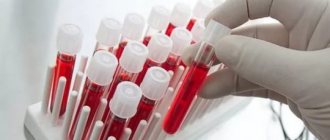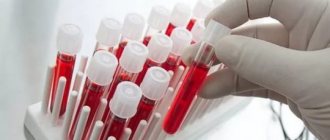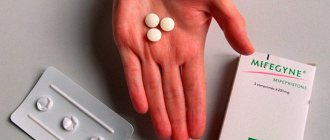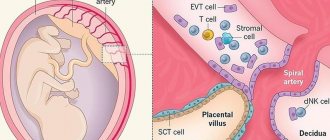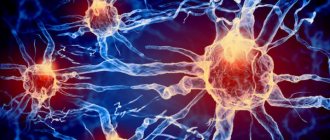Pyelonephritis
Colpitis
Thyrotoxicosis
Menopause
16149 October 15
IMPORTANT!
The information in this section cannot be used for self-diagnosis and self-treatment.
In case of pain or other exacerbation of the disease, diagnostic tests should be prescribed only by the attending physician. To make a diagnosis and properly prescribe treatment, you should contact your doctor. We remind you that independent interpretation of the results is unacceptable; the information below is for reference only.
Progesterone: indications for use, rules for preparing for the test, interpretation of results and normal indicators.
What is progesterone
Progesterone is a hormone of the female reproductive system, the synthesis of which occurs cyclically throughout the ovarian-menstrual cycle. The place of its synthesis is the woman’s ovaries, as well as the placenta during pregnancy.
The effects of this steroid substance in the female body are:
- Secretory transformations of the endometrium in the luteal phase. What does this mean? Due to estrogens, which are synthesized in the first phase of the cycle, active growth of the uterine mucosa occurs. Progesterone, on the contrary, has an antiproliferative effect. That is, it inhibits the growth of the endometrium, but ensures its secretory transformations (accumulation of glycogen in cells to ensure the trophic function of the embryo during pregnancy).
- Sedative effect.
- Relaxation of smooth muscle muscles (including the body of the uterus to maintain pregnancy). but progesterone, on the contrary, spasms the cervix, preventing the development of isthmic-cervical insufficiency during pregnancy.
- Transformations in the mammary glands to ensure lactation.
Causes of elevated progesterone levels:
- Presence of pregnancy;
- Hormonally active ovarian tumors;
- Chorionepithelioma;
- Bubble drift.
Reasons for decreased levels of the hormone progesterone in the blood:
- Luteal phase deficiency;
- Frozen (non-developing) pregnancy;
- Taking combined oral contraceptives.
When is it necessary to donate blood to check progesterone levels?
Since progesterone is a hormone, the level of which depends on the phase of the ovarian-menstrual cycle, therefore it is necessary to take it on certain days. If a woman is of reproductive age, and her cycle averages about 28 days, then the recommended interval for donating blood to check progesterone levels is days 21-23 of the ovarian-menstrual cycle.
The main functions of progesterone
- ensures the growth of glands in the uterine mucosa in the second half of the menstrual cycle;
- responsible for the regularity of menstruation;
- reduces the effects of estrogen;
- supports libido;
- its deficiency has a bad effect on a woman’s appearance;
- participates in the production of other steroids as an intermediate key link;
- thickens the mucus of the cervical canal, making it impermeable to sperm;
- promotes better embryo implantation by suppressing the immune system. Thanks to this, the embryo is not rejected by the mother’s body, and pregnancy occurs;
- inhibits lactation before the onset of labor, and a decrease in progesterone levels after the birth of a child is a signal for the production of prolactin;
- in the first trimester it suppresses spontaneous uterine contractions, relaxes the muscles of the uterus, protects the fertilized egg from rejection until the period of full formation of the feta-placental complex;
- probably, a decrease in progesterone concentration is the reason for the onset of labor;
- is a neurosteroid - affects the functioning of the brain;
- at the level of the central nervous system it helps to endure pregnancy and childbirth more easily.
Detailed description of the study
Progesterone is a female steroid hormone produced by the corpus luteum of the ovaries and, during pregnancy, by the placenta. The concentration of progesterone in the blood is determined to confirm or exclude ovulation during the menstrual cycle. The maximum concentration of progesterone is observed in the luteal phase of the cycle.
Produced by the corpus luteum of the ovaries. A progesterone test is prescribed to identify the causes of infertility, determine the presence of ovulation, diagnose an ectopic or pathological pregnancy, and to monitor the condition of the fetus and placenta during pregnancy in the presence of complications. The main function of the hormone estradiol is to prepare a woman’s body for pregnancy. Each month, estrogen causes the inner lining of the uterus, the endometrium, to grow and renew itself, while luteinizing hormone (LH) causes one of the ovaries to release an egg. In place of the released egg, the so-called corpus luteum is formed, which produces progesterone. Progesterone, together with the hormone secreted by the adrenal glands, stops the growth of the endometrium and prepares the endometrium of the uterus for the implantation of a fertilized egg, and after its implantation helps to maintain pregnancy: it suppresses the activity of the smooth muscles of the uterus, maintains the dominance of pregnancy in the central nervous system; stimulates the development of the terminal secretory sections of the mammary glands and the growth of the uterus, the synthesis of steroid hormones; has an immunosuppressive effect, suppressing the reaction of rejection of the fertilized egg. Stimulates sebum secretion. If fertilization does not occur, the corpus luteum disappears, progesterone levels drop and menstrual bleeding occurs. If the fertilized egg attaches to the wall of the uterus, the corpus luteum continues to produce progesterone. After a few weeks, the placenta takes over the function of the corpus luteum to produce progesterone, being the main source of this hormone during pregnancy.
An increase in progesterone concentration occurs during pregnancy, tumors of the adrenal glands and testicles, hydatidiform mole, and ovarian chorionepithelioma. A decrease in hormone levels occurs when there is a threat of miscarriage, galactorrhea-amenorrhea syndrome, taking oral contraceptives and certain medications.
Indications for progesterone testing
Indications for prescribing a blood test for progesterone levels:
- presence of ovarian-menstrual cycle disorders in women;
- searching for the causes of infertility;
- the presence of dysfunctional uterine bleeding;
- identification of luteal phase insufficiency both in preparation for pregnancy and for the elimination or prevention of isthmic-cervical insufficiency during pregnancy (shortening of the cervix, which can lead to miscarriage/premature birth);
- miscarriage;
- infertility;
- embryogenesis disorder;
- lack of lactation;
- control over the course of pregnancy;
- spotting during pregnancy;
- metrorrhagia of unknown etiology;
- suspicion of disease of the genital and mammary glands, thyroid gland, adrenal glands;
- determination of ovulation;
- suspected ectopic pregnancy;
- complications during gestation;
- early treatment using progesterone in the regimen;
- control over the condition of the placenta and fetus;
- in the IVF program at the stimulation stage.
Research in women is also carried out if there is a suspicion of an appendage cyst, obesity, or metrorrhagia. In men - if the presence of abnormalities in the development of the testicles, adrenal dysfunction, or decreased potency is suspected.
How to donate blood for hormones. Interpretation of analysis results.
Blood from a vein is used to test hormones.
Depending on the clinical signs indicating a specific pathology, an analysis with tests for specific hormones is usually prescribed.
The most complete picture of your health can be obtained by taking a test for the following hormones.
Thyroid hormones:
- T3 (triiodothyronine)
free – stimulates oxygen metabolism in tissues. Normal values: 2.6 - 5.7 pmol/l. - T4 (thyroxine)
– stimulates protein synthesis. Normal values: 0.7-1.48 ng/dl. - Antibodies to thyroglobulin (AT-TG)
are an important parameter for identifying a number of autoimmune diseases. Normal values: 0-4.11 U/ml. - Some others
.
Pituitary hormones:
- TSH (thyroid-stimulating hormone)
– stimulates the production of thyroid hormones (T3 and T4). Normal values: 0.4-4.0 mU/l. An elevated TSH value usually indicates decreased thyroid function. - FSH (follicle stimulating hormone)
. Normal values: in women - depends on the phase of the menstrual cycle. Phase I – 3.35-21.63 mU/ml; Phase II – 1.11-13.99 mU/ml; postmenopause – 2.58-150.53 mU/ml; girls under 9 years old 0.2-4.2 mU/ml. In men – 1.37-13.58 mU/ml. - LH (luteinizing hormone)
. Normal values: in women - depends on the phase of the menstrual cycle. Phase I – 2.57-26.53 mU/ml; Phase II – 0.67-23.57 mU/ml; postmenopause – 11.3-40 mU/ml; girls under 9 years old - 0.03-3.9 mU/ml. In men – 1.26-10.05 mU/ml. - Prolactin
.
The main function is to stimulate the development of mammary glands and lactation. Normal values: in women (from the first menstruation to menopause) – 1.2-29.93 ng/ml; in men – 2.58-18.12 ng/ml. Increased concentrations of prolactin are called hyperprolactinemia
. There are physiological and pathological hyperprolactinemia. Physiological hyperprolactinemia can be caused by breastfeeding, pregnancy, severe physical activity, and stress. An increased concentration of prolactin in women leads to menstrual irregularities and may cause infertility. In men, hyperprolactinemia leads to decreased libido and impotence. - ACTH (adrenocorticotropic hormone)
– stimulates the synthesis and secretion of hormones from the adrenal cortex. Normal values: 9-52 pg/ml. - Some others
.
Sex hormones:
- Testosterone
(male sex hormone) is produced by the adrenal glands and in the gonads (in men - in the testicles, in women - in the ovaries). Affects the development of the genital organs, the formation of secondary sexual characteristics, the growth of bones and muscles. Normal values: for men - 4.94-32.01 nmol/l, for women - 0.38-1.97 nmol/l. - Estrogens
(female sex hormones). The main estrogens - progesterone and estradiol - are produced by the adrenal glands and ovaries. Normal values of progesterone in women depend on the phase of the menstrual cycle: Phase I – 1.0-2.2 nM/l; Phase II - 23.0-30.0 nM/l; for postmenopause – 1.0-1.8 nM/l. Similarly for estradiol: phase I - 198-284 pM/l: phase II - 439-570 pM/l; for postmenopause – 51-133 pM/l. Elevated estrogen levels may indicate tumors of the ovaries and adrenal cortex, as well as cirrhosis of the liver. Reduced - for insufficient development and sclerosis of the ovaries.
Adrenal hormones:
- DEA-s (dehydroepiandrosterone sulfate)
is necessary for the synthesis of testosterone and estrogens. The normal range for the concentration of this hormone is: 3591-11907 nmol/l; in women – 810-8991 nmol/l. However, this is the general picture; when processing analysis data, the patient’s age must also be taken into account. - Cortisol
is involved in many metabolic processes and is actively produced as a result of the body’s response to hunger or stress. Normal values: for children under 16 years of age - 3-21 mcg/dl, for an adult - 3.7-19.4 mcg/dl. - Aldosterone
is responsible for regulating water-salt balance in the body. Normal values: 35 - 350 pg/ml.
Indications
Experts identify the following indications for which it is necessary to determine the concentration of progesterone:
- Irregularity of the menstrual cycle or its complete absence.
- Infertility of unknown origin.
- Presence of bleeding from the genitals.
- Monitoring the condition of the placenta in the second and third trimester of pregnancy.
- Determining the reasons for post-term pregnancy.
A correctly determined progesterone concentration helps to determine the causes of pathology and correct them in a timely manner.
Preparing for a blood test
General rules when preparing for blood tests (clinical, biochemical, enzyme immunoassay blood tests)
The study is carried out in the morning on an empty stomach - at least 8 to 12 hours must pass between the last meal and blood drawing. In the evening of the previous day, a light dinner is recommended. It is advisable to exclude fatty, fried foods and alcohol from the diet 1–2 days before the examination. If there was a feast the day before or a visit to the bathhouse or sauna, it is necessary to reschedule the laboratory test for 1 - 2 days.
You must refrain from smoking 1 hour before taking blood.
You should not donate blood after X-ray examinations or physiotherapeutic procedures.
It is necessary to exclude factors that influence the research results: physical stress (running, climbing stairs), emotional arousal. Before the procedure, you should rest for 10–15 minutes and calm down.
It must be remembered that the result of the study may be distorted by the effect of the medications taken or the products of their metabolism. Prescription and discontinuation of any drug is accompanied by changes in laboratory parameters. Therefore, before taking the test, you should consult your doctor about the possibility of limiting your medications to prepare for the test. It is recommended to stop taking medications before donating blood for testing, that is, blood is drawn before taking medications.
Taking into account the daily rhythms of changes in blood parameters, it is advisable to carry out repeated studies at the same time.
Different laboratories may use different research methods and units of measurement. In order for the assessment of the examination results to be correct and the results to be acceptable, it is advisable to conduct research in the same laboratory at the same time.
Taking water does not affect blood counts, so you can drink water.
General rules apply to all tests, but some tests require special preparation and additional restrictions.
It is very important to strictly follow the recommendations below, since only in this case will reliable research results be obtained.
Features of preparation
to individual laboratory tests
Clinical blood test
Proper preparation for a clinical blood test:
- blood is donated in the morning on an empty stomach, 4-5 hours after the last meal)
- 1-2 days before the test, exclude high-fat foods from your diet.
Study of cholesterol and lipid spectrum
To determine cholesterol and lipid spectrum, blood is taken strictly after a 12-14 hour fast. It is necessary to discontinue drugs that lower blood lipid levels within 2 weeks, unless the goal is to determine the lipid-lowering effect of therapy with these drugs.
Urea
1-2 days before the study, you must follow a diet: stop eating foods rich in purines - liver, kidneys, and also limit meat, fish, coffee, tea in your diet as much as possible. Intense physical activity is contraindicated.
Uric acid
It is necessary to follow a diet in the days preceding the study - refuse to eat foods rich in purines: liver, kidneys, limit meat, fish, coffee, tea as much as possible in the diet. Intense physical activity is contraindicated. It is necessary to discontinue medications such as caffeine, theobromine, theophylline, salicylates, ascorbic acid, antibiotics, sulfonamides, thiazole derivatives.
Alpha-2-macroglobulin
You must abstain from meat for three days before the test.
Anti-Mullerian hormone
Inhibin B
For women, the study is carried out on days 3-5 of the menstrual cycle. 3 days before taking blood, avoid intense sports training. The study should not be performed during any acute illness. Do not smoke 1 hour before taking blood.
ACTH
Cortisol
On the eve of the study, avoid taking medications such as glucocorticoids, estrogens, oral contraceptives. It is also necessary to avoid drinking alcohol, exercising, and smoking. Due to the fact that ACTH and cortisol are stress hormones, you need to calm down and relax for 20 minutes before donating blood. Any stress causes an unmotivated release of these hormones into the blood, which will lead to an increase in this indicator. The level of these hormones changes cyclically throughout the day, so the most informative results are studies conducted no later than 2 hours after sleep and before 10 am.
Bilirubin
It is not recommended to take ascorbic acid, medications or products that cause artificial coloration of the serum the day before.
Sex hormones
Tests for sex hormones in women are carried out only on the appropriate days of the menstrual cycle of a particular patient, as indicated by the doctor.
In women of reproductive age, the results of hormonal studies are influenced by physiological factors associated with the phase of the menstrual cycle. When examining sex hormones, indicate the phase of the menstrual cycle.
Hormones of the reproductive system must be taken strictly on the days of the cycle:
LH, FSH - 3-5 days of the cycle;
Estradiol - 5-7 or 21-23 days of the cycle;
Progesterone - days 21-23 of the cycle;
17-OH-progesterone - 7-9 days;
DHA - sulfate, testosterone - 7-9 days.
Prostate-specific antigen (PSA)
Blood sampling should be performed before palpation examination and massage of the prostate gland (PG), laser therapy, radiography, cystoscopy, colonoscopy. These therapeutic and diagnostic measures can cause a more or less pronounced and prolonged rise in PSA levels in the blood. Since the extent of such changes is unpredictable, blood sampling must be carried out either before or a week after the manipulations.
Prolactin
Blood is drawn in the morning, no earlier than 3 hours after waking up. Considering that prolactin levels can increase as a result of physical or emotional stress, after sexual intercourse, after staying in a sauna, or drinking alcohol, it is necessary to exclude these factors before the study. Before the examination, exclude palpation of the mammary glands and ultrasound examination of the mammary glands.
Diagnosis of infectious diseases
(including urogenital infections)
Blood sampling for diagnostics is carried out before the start of taking antibacterial and chemotherapy drugs or no earlier than 10–14 days after their discontinuation. When performing tests for the presence of infections, it should be taken into account that, depending on the period of infection and the state of the immune system, any patient may have a false negative result. But, nevertheless, a negative result does not completely exclude the presence of infection and in doubtful cases it is necessary to re-test.
Immunogram
A blood test is taken strictly on an empty stomach, after a 12-hour fast and always before starting to take antibacterial, anti-inflammatory and hormonal drugs or no earlier than 2 weeks after their discontinuation. If on the eve of the test there was a rise in temperature, any acute or exacerbation of a chronic disease, then it is better to reschedule the test.
Allergy research
(Immunoglobulin E, Allergens)
Basic rules for preparing for an allergy test:
● Stop drinking alcohol, dietary supplements, vitamins, aspirin, and medications (except for vital ones; must be agreed with your doctor) at least two days in advance.
● It is not recommended to conduct studies during immunosuppressive therapy (cytostatics, glucocorticoids, radiation therapy, chemotherapy) due to inhibition of immunoglobulin synthesis.
● To exclude false negative results, it is necessary to refrain from taking anti-allergy medications 5 - 7 days before taking a blood test.
● Blood is donated on an empty stomach. In the morning you should not drink coffee, tea, or juices.
Contraindications for the study are:
● menstrual cycle (you can take the test 3 days before or 5 days after menstruation);
● acute phase of any infection (ARVI, influenza, fever and others);
● taking antibiotics (7-10 days after discontinuation).
Thyroid hormone test
2 - 3 days before the study, do not take iodine-containing drugs, 1 month - thyroid hormones (to get true basal levels), unless there are special instructions from the endocrinologist. However, if the purpose of the study is to control the dose of thyroid hormone drugs, blood is drawn while taking the usual dose. It should be borne in mind that taking levothyroxine causes a transient, significantly increased level of total and free thyroxine in the blood for approximately 9 hours (by 15–20%).
Thyroglobulin
It is advisable to conduct the study at least 6 weeks after thyroidectomy or treatment. If diagnostic procedures such as a biopsy or thyroid scan are prescribed, then a study of TG levels in the blood must be strictly carried out before the procedures.
Creatinine
Eating a large amount of protein in the days leading up to the blood draw can lead to an increase in creatinine levels in the blood. Blood creatinine levels may increase due to intense physical activity.
Serum iron
Blood sampling should be done before starting to take iron-containing nutritional supplements and medications or no earlier than 2 weeks after the end of use.
Bleeding time
It is necessary to stop taking aspirin and other antiplatelet drugs 5-7 days before the examination, as they prolong bleeding time.
Hemostasis system
(APTT, D-dimer, coagulogram, lupus anticoagulant,
prothrombin index, thrombin time, fibrinogen)
It is necessary to stop taking hormones, heparin, contraceptives, aspirin, antiplatelet agents 5-7 days before the examination.
SA-15-3
Blood sampling should be done before or no earlier than 2 weeks after biopsy, surgery and breast massage.
SA-125
In order to exclude the possibility of false-positive results in women of childbearing age, blood sampling should be carried out in the first phase of the menstrual cycle (7th – 8th day).
UBC (bladder cancer antigen)
Urine collection should be carried out before or 10 days after invasive procedures, as well as before the start of specific treatment. The morning portion of urine is collected, and if this is not possible, then urine that has been in the bladder for at least 3 hours is collected.
Cholesterol and lipid spectrum
To determine cholesterol and lipid spectrum, blood is taken strictly after a 12-14 hour fast (after eating a fatty meal, the level of triglycerides increases significantly and remains high for several hours
Before blood is drawn, the patient must maintain his normal diet for 2 weeks.
Avoid alcohol intake for three days (the presence of alcohol in the blood is a common cause of hypertriglyceridemia, even in fasting patients).
It is necessary to discontinue drugs that lower blood lipid levels within 2 weeks, unless the goal is to determine the lipid-lowering effect of therapy with these drugs.
Calcium
For 3 days, avoid taking medications containing calcium.
Prenatal screening
It is carried out within strictly defined periods of pregnancy. Outside of these periods, the diagnostic significance of these indicators is low.
Gastrin
H. Pylori IgG
One day before taking blood, it is necessary to avoid drinking alcohol and coffee, and 1 hour before taking blood - smoking. It is better to donate blood in the morning, after an overnight period of fasting. The study is carried out on an empty stomach (12 hours after the last meal),
Before the study, the patient should not take medications that affect gastric secretion:
One week before the study, cancel: Atropine, Metacin, Platyfillin, Gastrocepin, Pepsidin, Ranitidine (Zantac, Ranisan), Omez (omeprazole), Gastrozole, famotidine (quamatel, ulfamid), Lansoprazole, Rabeprazole (Pariet), Esomeprazole (Nexium).
2-3 days before the study, stop medications that neutralize hydrochloric acid: Gaviscon, Phospholugel, Almagel, Gastal, Maalox, Megalac and others.
The patient should discuss the possibility of stopping these medications with their healthcare provider in advance.
It is optimal to study gastrin levels before starting drug treatment or after its completion.
Take tests constantly in the same laboratory - and your doctor will approximately know your personal normal values and any deviation from the norm will be immediately noticed by him.
Home visit Addresses of medical offices Frequently asked questions Personal data processing policy
